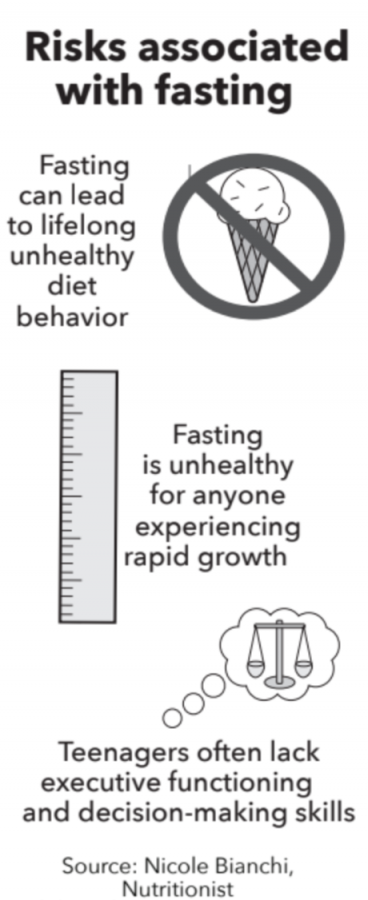Restrictive diets can foster bad habits
Limited eating hours are not recommended for adolescents
February 14, 2020
Although not eating for extended periods of time can be a healthful diet tool for adults, intermittent fasting may not be the right decision for teenagers.
“I choose to only eat eight hours a day and fast for 16 hours,” chemistry teacher Roderick Mobley said. “I have already lost seven pounds in the last two months.”
Other forms of intermittent fasting include limiting calories two days a week, alternate day fasting and fully fasting a few times a week, according to Cleveland Clinic.
While there is little research on intermittent fasting, it is proven to lead to weight loss, improved metabolism and lower blood pressure, according to Cleveland Clinic. While other diets such as Keto and gluten-free restrict what someone can eat, intermittent fasting restricts the times one can eat.
“Intermittent fasting is something you should do with the guidance of a nutritionist or physician,” nutritionist Nicole Bianchi said. “The youngest I would encourage someone to explore intermittent fasting is 25.”
People who experience rapid growth and change in their body, such as adolescents, should avoid intermittent fasting, according to Orange County Children’s Hospital.
“I do time-restricting eating where eat all of my food for the day in 10 hours, then fast for 14,” senior Isabelle Paul said. “I have heard that intermittent fasting can be bad for teenagers, but it helps me not overeat and manage my calories.”
Since executive functioning skills are not fully developed until age 25, it is hard for teenagers to make the right decisions regarding food and dieting, according to Bianchi. If a teenager intermittently fasts without those decision-making skills, it could cause a lasting unhealthy diet mentality.
“Studies show that one in two teenage girls engage in unhealthy weight control behaviors like restricting their calorie intake, which can form a negative relationship with food,” Bianchi said. “It is better for teenagers to build a healthy relationship with food rather than being on a restrictive diet.”
Eating a substantial breakfast and lunch and a balanced dinner can be a healthier
alternative to intermittent fasting, as it is easier to digest and metabolize food during the day than it is overnight, according to Bianchi. Shifting calorie intake to earlier in the day can give similar benefits, but does not include fasting.
“I would be hesitant to recommend intermittent fasting to high school students because they have so much to do everyday including sports,” Mobley said. “I think students need a positive energy supply and won’t have enough energy to consistently perform at peak level if they are not taking in enough during the day.”










